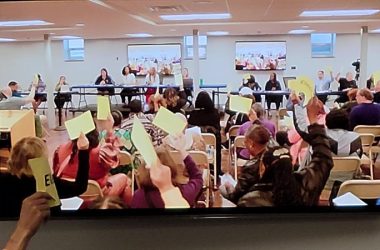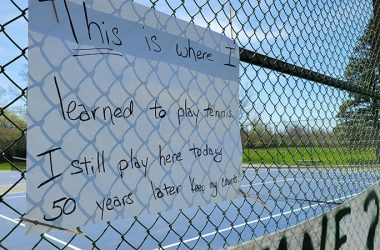Gov. J.B. Pritzker announced on Tuesday guidelines that will allow K-12 schools, community colleges and higher education institutions to safely resume in-person instruction for the upcoming academic year.
The focus will be on local control with school administrators deciding what is best for their students and communities.
Dr. Jennifer Garrison, a member of the Transition Advisory Workgroup, said, “We acknowledge and thank the governor’s office for the emphasis on local control. We must focus on the safety of our staff and students first and foremost and at the same time be creative in how we return to learning in-person.”
To help schools meet these guidelines and prevent the spread of COVID-19, the Illinois Emergency Management Agency (IEMA) will provide public K-12 districts in Illinois with 2.5 million cloth face masks, allowing K-12 schools to provide a cloth face mask to all students and staff.
“Classroom learning provides necessary opportunities for our students to learn, socialize, and grow. The benefits of in-person instruction can’t be overstated,” Pritzker said. “In close consultation with IDPH, infectious disease experts at the University of Illinois at Chicago, and other public health professionals, the guidance focuses on keeping students, teachers and families healthy and safe. It recognizes that Illinois is a diverse state, and school districts and institutions of higher education across Illinois will face unique challenges in how they’ll operate within their communities.”
The Illinois State Board of Education (ISBE) received $569 million in federal funding from the CARES Act for K-12 education, approximately $512 million of which will go directly to school districts to address local needs in response to the COVID-19 pandemic.
IBSE will use the remaining $54.1 million to provide additional funding to schools in six categories: laptops and tablets, internet connectivity, virtual coaching for teachers, professional development and support for entities who cannot receive direct funds due to ineligibility for Title I.
Local education agencies must apply to ISBE to receive funding from the CARES Act and the amount received will be based on the number and percentage of low-income students they serve. ISBE has already received applications from 580 local education agencies for this funding with the goal of purchasing a variety of tools and resources, including technology devices, wi-fi hotspots, and health and safety equipment for schools in need. Local school districts also plan to use funding to hire mental health support staff to provide services for students, families, and staff.
Guidance for K-12 schools
The guidance released by ISBE and IDPH today allows schools to bring students back to school buildings in the fall while ensuring the health and safety of students and staff remains the top priority. The guidance was developed in collaboration with 56 educators, superintendents, social workers, nurses, and other stakeholders from across the state. View the guidance here.
“Nothing compares to face-to-face interactions between students and their teachers,” said State Superintendent of Education Dr. Carmen I. Ayala. “The dedication of Illinoisans to social distancing over the past several months has allowed us to plan to bring students back to classrooms this fall while keeping health and safety our number 1 priority.
“School will look a bit differently than we are accustomed to, but our focus remains on ensuring each and every child receives a high quality education. As much as possible, we have tried to provide common and clear requirements,” she said, “while preserving the flexibility of each school and district to develop a reopening plan that meets the needs of the community and the children that they serve.”
ISBE strongly encourages schools and districts to provide in-person instruction for all students, especially those under age 13, to ensure children have rich instructional environments.”
The IDPH requirements for schools to reopen in Phase 4 are:
- Require use of appropriate personal protective equipment (PPE), including face coverings.
- Prohibit more than 50 individuals from gathering in one space.
- Require social distancing whenever possible.
- Conduct symptom screenings and temperature checks or require self-certification that individuals entering school buildings are symptom free.
- Increase schoolwide cleaning and disinfection.
- Require social distancing be observed as much as possible.
- Require that schools conduct symptom screenings and temperature checks or require that individuals self-certify that they are free of symptoms before entering school buildings.
- Require an increase in schoolwide cleaning and disinfection.
To ensure Illinois school districts are able to obtain the necessary supplies to resume in-person instruction safely, ISBE and the Chief Procurement Office Bureau of Strategic Sourcing have secured several joint purchase agreements that K-12 schools can utilize to obtain supplies at prices that may be more competitive than purchasing on their own. ISBE will continue to expand the number of purchasing agreements in the coming weeks.
Guidance for higher education institutions
The Illinois Board of Higher Education (IBHE) established guidelines for higher education institutions to safely reopen their classrooms based on input from IDPH and higher education leaders throughout Illinois. When students return to campus this fall, they can expect new prevention measures from colleges and universities, including social distancing, physical spacing, hand sanitizing stations, face covering requirements and regular monitoring of students for symptoms of COVID-19.
Schools are developing policies around traffic flow, cleaning of public spaces and staggered schedules for the use of laboratories, auditoriums and other group facilities. Small-group sessions and meetings with professors will also have to adhere to social distancing guidelines. Nevertheless, colleges expect dormitories, cafeterias, libraries, bookstores and other amenities of college life to be available to students, subject to the approved guidelines.
The full list of guidelines is available at The Illinois Board of Higher Education website.
Community colleges
As each region across the state prepares to enter Phase 4 of the Restore Illinois plan, Illinois community colleges are committed to welcoming students back to campus in the fall of 2020.
Guidance for Illinois’ community colleges takes into consideration where each institution is located and is separated into three main categories: general health and safety, instructional guidelines, and student services. Among the key recommendations are:
- In-person education will require face coverings to be worn by faculty, staff and students.
- Community colleges should conduct health screenings on employees, students and visitors before each campus visit.
- Community colleges should take additional measures to ensure social distancing and safety as determined by the features of spaces, learning methods and other factors.
- Each community college should consider the needs of vulnerable staff or students when administering guidelines.
The guidance was developed in partnership with the ICCB’s Return to Campus Committee and approved by IDPH. The full list of guidelines is available at the ICCB website.
Financial aid assistance and college planning
As students prepare to return to higher education institutions this fall, the administration is offering information and guidance regarding financial aid. The Illinois Student Assistance Commission (ISAC) offers assistance to students in completing the Free Application for Federal Student Aid (FAFSA) or the recently launched Alternative Application for Illinois Financial Aid, a path to financial aid for undocumented and transgender students made possible by Gov. Pritzker.
“The Illinois Student Assistance Commission is here to support students on their path to — or back to — college this fall,” said Eric Zarnikow, Executive Director of ISAC. “We continue to provide free resources to help students and families with college planning and financial aid through one-on-one assistance from the ISACorps members in their community, our call center, and the tools and resources on our website, at www.isac.org.
“If you need help completing your FAFSA or Alternative Application for Illinois Financial Aid or in seeking financial aid adjustments based on changed financial circumstances, or just aren’t sure how to find your educational path beyond high school, please contact us for assistance.”
Thousands of Illinois families are facing new financial challenges as a result of the ongoing COVID-19 pandemic. If needed, students can seek an adjustment in their financial aid offers from colleges and universities for the fall based on a change in their financial circumstances.
Students in need of additional financial assistance should contact the financial aid office at the colleges or universities where they are enrolled or have been admitted. ISAC is available to guide students and families through this process.
ISAC also offers additional support services like “ISAC College Q&A,” a free text messaging service that helps students stay on track with their college plans. Through ISAC College Q&A, students and families can get answers to college planning and financial aid questions, as well as reminders for important deadlines, sent directly to their phones from ISAC experts. Interested families can sign up online here. Assistance is available in English and Spanish.
Families looking for additional resources and links specifically related to returning to campus and financial aid during the COVID-19 pandemic should visit https://www.isac.org/covid-19/.



